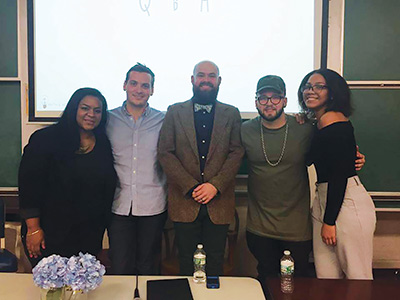 “In the dressing room before a show, we would read the psalms as a band and then walk out into arenas and stadiums — the words igniting us, inspiring us.” — Bono, activist and lead singer of U2
“In the dressing room before a show, we would read the psalms as a band and then walk out into arenas and stadiums — the words igniting us, inspiring us.” — Bono, activist and lead singer of U2
The Psalms are a treasure trove of poetry, songs, prayer, and inspiration for not only expressing the human condition but for bringing us closer to God. Recently, two remarkably different Christian poets collaborated to highlight the power and beauty of the psalms. David Taylor, professor of theology and culture, sat down with Eugene Peterson, longtime pastor, scholar and prolific writer and translator of Scripture, and Bono, activist and lead singer of world-famous rock band U2. Their reflections include the spiritual power and profound honesty of the psalms.
The remarkable collaboration was many years in the making. The globe-trotting singer had been mentioning the scholar’s work for years in his interviews, including the fact that Bono read Peterson’s translation of the New Testament to his dying father. Bono regularly quoted Peterson’s remarkable translation of Old and New Testament, The Message, on stage–during U2’s Elevation tour, for example, Bono would share the Message’s electric, accessible rendition of Psalm 116 before launching into “Where the Streets Have No Name”: What can I give back to God for the blessings he’s poured out on me? I’ll lift high the cup of salvation — A toast to God! I’ll pray in the name of God; I’ll complete what I promised God I’d do, And I’ll do it together with his people.
One day, Peterson’s students rushed to tell him that the lead singer of U2 had called The Message “the most important book he’d read in his whole life.” The students were thrilled—but Peterson had never heard of Bono or U2! Both men, however, have long shared a passion for bringing out the vitality and inventiveness of the original language of Scripture; to awaken understanding and stir listeners to respond.
Along with the suggestions from Taylor on practices for reading the Psalms, and the video featuring him, Bono and Eugene Peterson, be sure to visit FullerStudio to collectively view the amazing video, writings, and visuals that were the result of this collaboration:
Reading tips for the Psalms:
- Pay attention to the whole of a psalm, not just to the parts of a psalm.
- Read the psalms consistently, rather than occasionally and sporadically.
- Pay attention to the internal coherence of a psalm or a section of psalms, rather than allowing them to remain fragmented parts, reflective of our immediate and self-absorbed interest.
- Read the psalms out loud, not just silently.
- Read and sing and pray the psalms together, not just alone.
- Pay attention the Psalter’s “hospitable ‘I’” and its “intimate communal” sense, rather than allowing the individual expressions to devolve to individualism and the communal expressions to devolve to an impersonal communalism.
- Immerse yourself in the metaphors that the psalmist employs, rather than remaining distant and detached from them.
- Pay attention to the placement and role of the psalms in the biblical canon, rather than viewing them as isolated and idiosyncratic.



